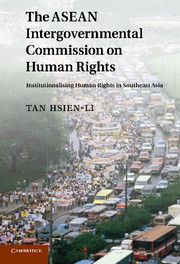 The ASEAN Intergovernmental Commission on Human Rights
The ASEAN Intergovernmental Commission on Human Rights Book contents
- Frontmatter
- Contents
- List of tables
- Preface
- 1 Charting the human rights institutionalisation process in Southeast Asia
- 2 Enough of ‘Asian values’: roots of the ASEAN states' reticence towards human rights
- 3 Self-determination and democracy: the human rights experiences of five ASEAN states
- 4 Instituting the regional rights regime: the ASEAN Intergovernmental Commission on Human Rights (AICHR) and the role of civil society
- 5 Human rights understanding between the ASEAN region and the United Nations: convergence, regional cohesion, and national responsibility
- 6 The unexplored aspect of human rights: what ASEAN needs to understand about the right to development
- 7 Sustaining AICHR's substantive empowerment: implementation, integration, and international law
- Bibliography and sources
- Index
4 - Instituting the regional rights regime: the ASEAN Intergovernmental Commission on Human Rights (AICHR) and the role of civil society
Published online by Cambridge University Press: 07 September 2011
- Frontmatter
- Contents
- List of tables
- Preface
- 1 Charting the human rights institutionalisation process in Southeast Asia
- 2 Enough of ‘Asian values’: roots of the ASEAN states' reticence towards human rights
- 3 Self-determination and democracy: the human rights experiences of five ASEAN states
- 4 Instituting the regional rights regime: the ASEAN Intergovernmental Commission on Human Rights (AICHR) and the role of civil society
- 5 Human rights understanding between the ASEAN region and the United Nations: convergence, regional cohesion, and national responsibility
- 6 The unexplored aspect of human rights: what ASEAN needs to understand about the right to development
- 7 Sustaining AICHR's substantive empowerment: implementation, integration, and international law
- Bibliography and sources
- Index
Summary
Introduction
In the previous chapter, we saw the differing attitudes of Indonesia, the Philippines, Thailand, Malaysia, and Singapore towards human rights being shaped by their political experiences during the nation-building phase. As was often the case, the struggle for democracy was followed by the consolidation of power in tumultuous times. This has proven to be so pervasive that it has taken these five states a fairly long time to be convinced of the international human rights movement. Nevertheless, change has begun to happen as the era of ‘strongman’ leadership passes. These five societies have gradually gone towards more openness, democracy, and respect for human rights due to heightened awareness among their civil societies and domestic populations. State leaders inevitably have had to accommodate these powerful internal demands or risk losing electoral support. In the worst case scenario, some risked being overthrown if public dissent reached boiling point. As domestic political culture continues to mature, states like Indonesia and the Philippines have taken such pride in their democratic credentials to become strong regional advocates of human rights and democracy. This exists notwithstanding the continuation of human rights abuses within their societies and the challenges their national human rights commissions face.
Leaving aside the open question of whether the remaining Association of Southeast Asian Nations (ASEAN) five states of Brunei, Cambodia, Laos, Myanmar, and Vietnam would have political developments that herald a more open, democratic, and affirmative environment for human rights, especially with the advent of the ASEAN Intergovernmental Commission on Human Rights (AICHR), this chapter examines how the impetus for an ASEAN human rights mechanism arose and how the differing experiences of the original ‘ASEAN-5’ states have helped to mould this process.
- Type
- Chapter
- Information
- The ASEAN Intergovernmental Commission on Human RightsInstitutionalising Human Rights in Southeast Asia, pp. 139 - 180Publisher: Cambridge University PressPrint publication year: 2011
- 2
- Cited by


